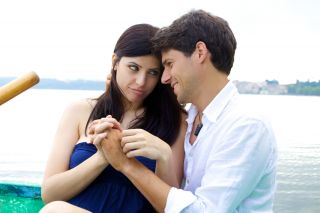
Are you falling in love? How can you tell?
There’s no question that the early stages of a relationship can be confusing. You might puzzle over your own feelings, and wonder what the
person you’re dating really thinks of you. Your own emotions may be difficult to fully decipher, and trying to categorize them as falling in love or as just a passing attraction can be tricky. Is what you're feeling the real thing, or are you just prone to feeling this way and need to be careful moving forward?
Drawing on recent research (focused on heterosexual relationships), here are some questions to help you sort it out:
- Are you suddenly doing new things?
As people fall in love, they often branch out beyond their normal
range of activities and try those that their partners favor. You might
find yourself trying new foods, watching new shows, or attempting new
activities like running, fishing, or gambling. People who fall in love
tend to report growth in the content and diversity of their own
self-concepts (Aron, Paris, & Aron, 1995).
- Have you been especially stressed lately?
As welcome as falling in love might be, evidence links the experience with higher levels of the stress hormone cortisol
(Marazziti & Canale, 2004). So if you’re anxious, tense, or just
plain jittery, it might be a normal response to the strain of repeated
social encounters with someone whose impression matters deeply to you.
- Are you highly motivated to be with this person?
Transitioning from a casual relationship to falling in love may have a chemical underpinning: Evidence shows that dopamine-rich
areas of the brain are involved in the beginning stages of love
(Fisher, Aron, & Brown, 2005); these areas are considered part of
the brain’s “reward system” and serve as highly motivational. Once
couples are “in love” for a while, the intensity of these emotions tends
to decline and different areas of the brain, potentially more closely
linked to attachment, become more active.
- Does the person you’re falling for return your feelings?
If you’re a woman and you feel like you’re falling in love, you
might be interested to know that women experience reciprocity in those
emotions more than men (Sanz Cruces et al., 2015). Maybe women are more
apt to hold back their emotions until they believe they are returned, or
maybe women are more successful at seducing partners. In either case,
women who think they’re falling in love tend to have their feelings
returned more often than men, making them more likely to find their
feelings turn into relationships.
- How intense are your emotions?
People high in attachment anxiety (i.e., they question their own self-worth
in relationships) tend to experience a high degree of passion when
romance is budding (Sanz Cruces et al., 2015). If that's not you, a lack
of intense feeling isn’t necessarily a sign that Cupid hasn’t
struck—not everyone experiences falling in love the same way. In fact,
those who have avoidant attachment orientations tend to fall in love with much less intensity.
- Do you fall in love frequently?
If falling in love is a feeling you feel frequently, you'll have
less chance of missing the real thing—but more chance of heartache from
mistaking attraction for something more. New evidence suggests that men
fall in love more frequently than women (Sanz Cruces, Hawrylak, &
Delegido, 2015). Researchers can explain this tendency from an
evolutionary perspective, linking love to sex:
Whereas women are likely to be more stringent in their partner criteria
before declaring love, because their potential investment in an
offspring is greater (e.g., pregnancy, childbirth), such emotions for men might promote reproduction and could therefore be considered evolutionarily advantageous.
- Are you tempted to say, “I love you”?
A sure sign of romantic interest, some people are more hesitant to
utter these three words than others. Although people might imagine that
women are the first to utter it, though, research on heterosexual
couples again indicates that it's men who are more apt to say “I love
you” first (Harrison & Shortall, 2011). They also tend to fall in
love faster.
- Are you investing more in this person? One hallmark of successful couples is investment—all the time, energy, emotions, etc. that people put into their relationships (Rusbult, 1980). People falling in love are likely increasing their investment in a person, linking their lives together in a way that might promote commitment and stability.
Advertisement
Falling
in love is a uniquely intense period of time for anyone. But we need to
sort out a lot of other questions during a falling-in-love phase:
Beyond clear attraction, is this person someone who will support you,
respect you, understand you, and be compassionate with you? And does
this person share your values and priorities?If you're lucky, putting in the time and effort during this initial period will pay off, and your mutual attraction can transition into a more stable (and less stressful) long-term relationship.
References
Aron, A., Paris, M., & Aron, E. N. (1995). Falling in love: Prospective studies of self-concept change. Journal of Personality and Social Psychology, 69(6), 110-1112.

No comments:
Post a Comment